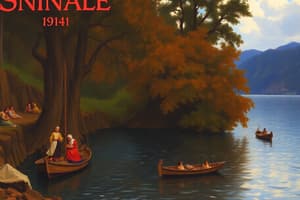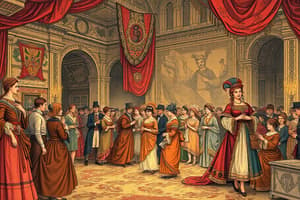Podcast
Questions and Answers
▪ Study of the past
▪ Chronological record of significant events
often including an explanation of their causes
▪ Study of the past ▪ Chronological record of significant events often including an explanation of their causes
Traditional Understanding
▪ Came from Greek word “_” that means “Knowledge acquired through inquiry or investigation”
▪ Sources are oral traditions in forms of epics, songs, artifacts, architecture, memory etc.
▪ Came from Greek word “_” that means “Knowledge acquired through inquiry or investigation” ▪ Sources are oral traditions in forms of epics, songs, artifacts, architecture, memory etc.
Modern Understanding and Historia
▪ period where no written records exist or when the writings of people were not preserved
▪ analyzed through fossils and artifacts by Archaeologists and Anthropologists
▪ period where no written records exist or when the writings of people were not preserved ▪ analyzed through fossils and artifacts by Archaeologists and Anthropologists
Pre-History
▪ period when man started to write and record events using a system of writing
▪ analyzed through wood carves, engraved metals, written papyrus, written papers
▪ period when man started to write and record events using a system of writing ▪ analyzed through wood carves, engraved metals, written papyrus, written papers
▪ “Writing of history” (Historical Writing)
▪ Based on critical examination of sources, selection of particular details from authentic materials in those sources and the synthesis of
those details into a narrative
▪ Done through “” with the
aid of “”
▪ “Writing of history” (Historical Writing) ▪ Based on critical examination of sources, selection of particular details from authentic materials in those sources and the synthesis of those details into a narrative ▪ Done through “” with the aid of “”
▪ Looking for data through Historical sources.
▪ Determining the data as a Primary or Secondary
source.
▪ Analyze the data through historical criticisms.
▪ Looking for data through Historical sources. ▪ Determining the data as a Primary or Secondary source. ▪ Analyze the data through historical criticisms.
Historical Timeframe of the Philippines
Historical Timeframe of the Philippines
▪ Produced at the same time as the event being studied (Contemporary Accounts)
▪ Include documents or artifacts created by a witness or participant of the event
▪ “Firsthand testimony,” “Eyewitness accounts”
▪ It may include diaries, letters, interviews,
photographs, newspapers
▪ Produced at the same time as the event being studied (Contemporary Accounts) ▪ Include documents or artifacts created by a witness or participant of the event ▪ “Firsthand testimony,” “Eyewitness accounts” ▪ It may include diaries, letters, interviews, photographs, newspapers
6 Points of inquiries to evaluate Primary sources (Garraghan, 1950)
6 Points of inquiries to evaluate Primary sources (Garraghan, 1950)
HISTORICAL SOURCES?
HISTORICAL SOURCES?
▪ Produced by authors who used and interpreted primary sources
▪ Analyzed a scholarly question and often use primary source as evidence
▪ Include books, theses, dissertations, journals, magazines, knowledge of historians
▪ Written few years after the exact time of the event
▪ Produced by authors who used and interpreted primary sources ▪ Analyzed a scholarly question and often use primary source as evidence ▪ Include books, theses, dissertations, journals, magazines, knowledge of historians ▪ Written few years after the exact time of the event
_
▪ The closer the date of creation, the more reliable one.
_
▪ The more recent, the more reliable one.
_ ▪ The closer the date of creation, the more reliable one. _ ▪ The more recent, the more reliable one.
_ is the practice of verifying the authenticity of evidence by examining its physical characteristics of the time when it was produced; and the materials used for the evidence.
_ is the practice of verifying the authenticity of evidence by examining its physical characteristics of the time when it was produced; and the materials used for the evidence.
_ on the other hand, is the examination of the truthfulness of the evidence.
_ on the other hand, is the examination of the truthfulness of the evidence.
two kinds of criticism
two kinds of criticism
_ examines the authenticity of the document or the evidence being used
_ examines the authenticity of the document or the evidence being used
_ examines the truthfulness of the content of the evidence.
_ examines the truthfulness of the content of the evidence.
Famous Italian traveler born in Vicenza around 1490 and died in the same city in 1534
Famous Italian traveler born in Vicenza around 1490 and died in the same city in 1534
In Pigafetta’s account, their fleet reached what he called the _ or the _
In Pigafetta’s account, their fleet reached what he called the _ or the _
The fleet went to _ (Homonhon) and there they found what he referred to as the
_
The fleet went to _ (Homonhon) and there they found what he referred to as the _
On _, Pigafetta recounted that they saw _, a long boat full of people in _.
On _, Pigafetta recounted that they saw _, a long boat full of people in _.
The gold was abundant that parts of the ship and of the house of the king were made of gold. This king was named _
The gold was abundant that parts of the ship and of the house of the king were made of gold. This king was named _
On March 31st (Easter Sunday),Magellan ordered the chaplain to preside a Mass by the shore
On March 31st (Easter Sunday),Magellan ordered the chaplain to preside a Mass by the shore
By _, _ and his men reached the port of _ (Cebu) with the help of _ who offered to pilot them in going to the island.
By _, _ and his men reached the port of _ (Cebu) with the help of _ who offered to pilot them in going to the island.
_ died in battle. He was pierced with a _
_ died in battle. He was pierced with a _
Flashcards are hidden until you start studying



